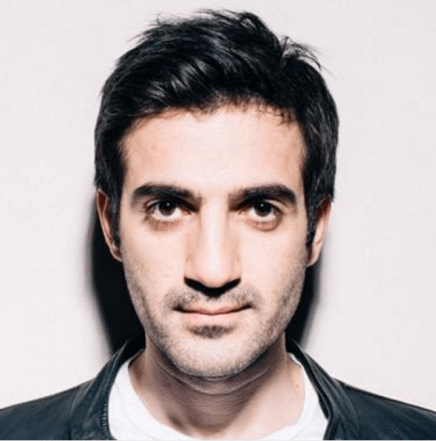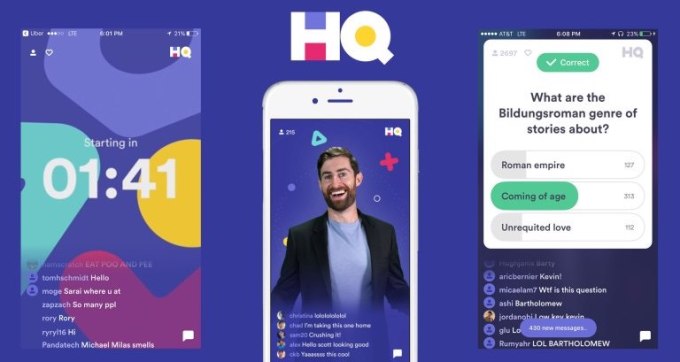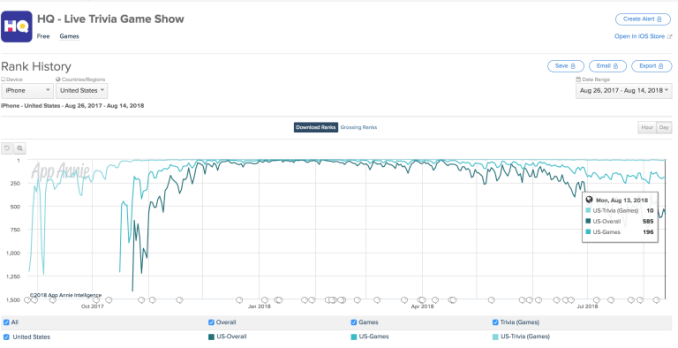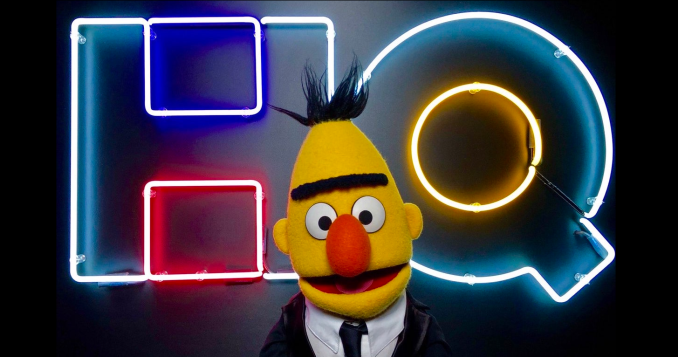This week’s banishment of host Scott Rogowsky was merely a symptom of the ongoing struggle to decide who will lead HQ Trivia. According to multiple sources, over half of the startup’s staff signed an internal petition to depose CEO Rus Yusupov who they saw as mismanaging the company. But Yusupov then fired some core supporters of the mutiny, leading to a downward spiral of morale that mirrors HQ’s plummeting App Store rank.
TechCrunch spoke to multiple sources familiar with HQ Trivia’s internal troubles to piece together how the live video mobile game went from blockbuster to nearly bust. Two sources said HQ recently only had around $6 million in the bank but was burning over $1 million per month, meaning its runway could be dwindling. But its early investors are reluctant to hand Yusupov any more cash. “

Employees petitioned to remove HQ Trivia’s CEO Rus Yusupov
HQ reimagined gaming and mobile entertainment with the launch of its 12-question trivia game in August 2017 where players all competed live in twice-daily shows with anyone who got all the answers right split a cash jackpot. The games felt urgent since you could only participate at designated times, fun to play against friends or strangers, and winning carried a significance no single-player or non-stop online game could match.
When TechCrunch wrote the first coverage of HQ Trivia in October 2017, it had just 3500 concurrent players. But by January it had climbed to the #3 game and #6 overall app in the App Store, and grown to 2.38 million players by March. Quickly, copycats from China and Facebook entered the market. But they all lacked HQ’s secret weapon — its plucky host comedian Scott Rogowsky. Affectionately awarded nicknames like Quiz Daddy, Quiz Khalifa, Host Malone, and Trap Trebek from the “HQties” who played daily, he was the de facto face of the startup.
Yet HQ had some shaky foundations. Co-founder Colin Kroll, who’d also started Vine with Yusupov and sold it to Twitter, had been fired from Twitter after 18 months for being a bad manager, Recode reported. He’d also picked up a reputation of being creepy around female employees, as well as Vine stars, TechCrunch has learned. Rapid growth and an investigation by early HQ investor Jeremy Liew that found no egregious misconduct by Kroll paved the way for a $15 million investment. The round was led by Founders Fund’s Cyan Bannister, and it valued HQ at over $100 million.

Yusupov failed to translate that cash into sustained growth and product innovation. His public behavior had already raised flags. He yelled at a Daily Beast reporter after the outlet’s Taylor Lorenz interviewed Rogowsky without Yusupov’s approval, threatening to fire the host. “You’re putting Scott’s job in jeopardy. Is that what you want? . . . Please read me your story word for word,” Yusupov said. When he learned Rogowsky had expressed his preference for salad restaurant chain Sweetgreen, Yusupov shouted “He cannot say that! We do not have a brand deal with Sweetgreen! Under no circumstances can he say that.” The next day, Yusupov falsely claimed he’d never threatened Rogowsky’s job.
With HQ’s bank account full, sources say Yusupov was extremely slow to make decisions, allowing HQ to stagnate. The novelty of playing trivia for money via phone has begun to wear off, and people increasingly ignored HQ’s push notifications to join its next game. But beyond bringing in some guest hosts and the option to buy a second chance after a wrong answer, HQ ceased to evolve. HQ fell to the #196 game on iOS and the #585 overall app as concurrent players waned.

That’s when things started to get a bit Game Of Thrones.
Pawns In A CEO War
Liew pushed for HQ to swap Kroll into the CEO spot in September 2018 while moving Yusupov to Chief Creative Officer, which was confirmed despite an HR complaint against Kroll for aggressive management. However, three sources tell TechCrunch that Yusupov pushed that HQ employee to file the complaint against Kroll. As the WSJ reported after Kroll’s death, that employee later left the startup because they felt that they’d been exploited. “There was definitely what felt like manipulation there, and that’s also why that employee resigned from the company.” one source said. Another source said that staffer “believed Rus used their unhappiness about work to use them as a pawn in his CEO war and not because Rus actually cared about resolving things.”
Cyan of Founders Fund stepped down from HQ’s board after the decision to swap out Yusupov due to her firm’s reputation of keeping founders in control, Recode’s Kurt Wagner reported. Sources say that despite Kroll’s reputation, the staff believed in him. “Colin loved HQ and was dedicated to all the employees more than Rus. Rus cares about Rus. Colin cared about the content” a source tells me.

Three sources say that in a desperate ploy to retain power and prevent Kroll’s rise, Yusupov suggested Rogowsky, a comedian with no tech or management experience, be made CEO of HQ Trivia. He even suggested the company film a reality show about Rogowsky taking over. That idea was quickly shot down as preposterous.
“It was a very personal desperation tactic not to have Colin be CEO. It was not a professionally thought-out idea” a source tells me, though another said it was always hard to tell if Yusupov’s crazy ideas were jokes. Both Yusupov and HQ Trivia declined to respond to multiple requests for comment, but we’ll update if we hear back.

HQ Trivia co-founder Colin Kroll passed away in December
Then tragedy struck in December. Kroll, then CEO, was found dead in his apartment from a drug overdose. Employees were distraught over what would happen next. “Colin’s plan was to ship fast, and get new things out there” a source says, noting that Kroll had pushed for the release of HQ’s first new game type HQ Words modeled after Wheel Of Fortune. “He wasn’t perfect but in the time he was in charge, the ship started to turn, but when Rus took over again it was like the 9 months where we did nothing.”
Coup d’éHQ
By February 2019, HQ’s staff was fed up. Two sources confirm that 20 of the roughly 35 employees signed a letter asking the board to remove Yusupov and establish a new CEO. With HQ’s download rate continuing to sink, they feared he’d run the startup into the ground. One source suggested Yusupov might rather have seen the whole startup come crashing down with the blame placed on the product than have it come to light that he played a large hand in the fall. The tone of the letter, which was never formally delivered but sources believe the board knew of, wasn’t accusatory but a plea for transparency about the company’s future and the staff’s job security.
At a hastily convened all-hands meeting in late February, HQ investor Liew told the company his fund Lightspeed would support a search for a new CEO to replace Yusupov, and provide that new CEO with funding for 18 more months of runway. Liew told the staff he would step down from the board once that CEO was found, but the search continues and so Liew remains on HQ’s board.
“Mostly everyone was on Jeremy’s side as no one wanted to work under Rus. Jeremy wasn’t trying to screw him over the way Rus would screw other people over. He just wanted to do what was right, getting behind what everyone wanted” a source said of Liew.
Instead, HQ’s board moved forward with instituting a new executive decision-making committee composed of Yusupov, HQ’s head of production Nick Gallo, and VP of engineering Ben Sheats. Yusupov would remain interim CEO, and he continued to cling to power and there’s been little transparency about the CEO replacement process. Until a new CEO is found, HQ must subsist on its existing funds. The staff is “always worried about running out of runway” and are given vague answers when they ask leadership about how much money is left.

On March 1st, the committee emerged from a meeting and fired three employees — two who had spearheaded the petition and been vocal about Yusupov’s failings.
One who wasn’t fired was Rogowsky, despite sources saying at one point he’d tried to organize the staff to go on strike. Other employees had been cautious about standing up to Yusupov. “Everyone was terrified of retaliation. Their fears have totally been validated” a source explains. Engineers and other staffers with strong employment prospects began to drain out of the company. Those left were just trying to hold onto their jobs. Without inspiring leadership or a strategy to reverse user shrinkage, recruiting replacements would prove difficult.
Yusupov remains on the board, along with Tinder CEO Elie Seidman who Yusupov appointed to his additional common seat. Liew retains his seat until the new CEO is found and given that seat. And Kroll’s seat appears to have gone to Lightspeed partner Merci Victoria Grace. Lightspeed and Cyan of Founders Fund declined to respond to requests for comment.
[Update: Seidman tells TechCrunch that the he sees the internal struggle for the CEO role as over now that Yusupov has accepted that a new CEO will be installed. That search is moving along, and the CEO chosen will report to the board but otherwise be given full autonomy to run the company as they choose. That includes having hiring and firing power over Yusupov. He did not dispute any other claims from this article. Seidman rightly believes HQ has contributed important ideas to the mobile gaming ecosystem, and now it’s the startup’s responsibility to turn those ideas into a steady business.]
Losing Face
Tensions at HQ and a desire to diversify his prospects led Rogowsky to pick up a side gig hosting baseball talk show ChangeUp on the DAZN network, TMZ reported this week. He’d hoped to continue hosting HQ during its big weekend contests. But tensions with Yusupov and the CEO’s desire for the host to remain exclusively at HQ led negotiations to sour causing Rogowsky to leave the startup entirely. TechCrunch was first to report that he’s been replaced by former HQ guest host Matt Richards, who Yusupov bluntly told me Friday had polled higher than Rogowsky in a SurveyMonkey survey of HQ’s top players.

In tweets, Rogowsky revealed that that “Sadly, it won’t be possible for me to continue hosting HQ concurrently as I had hoped” noting, “I wasn’t given the courtesy of a farewell show.” Finding a way to preserve Rogowsky’s ties to HQ likely would have been best for the startup. TechCrunch had raised the concern a year ago that unless Rogowsky was properly locked in with an adequate equity vesting schedule at HQ, he could leave. Or worse, he could be poached by Facebook, Snapchat, or YouTube to host an HQ competitor.
“Rus is a visionary but not a good leader. He is extremely manipulative in an unproductive way. He’s a dude who just cares a lot about his reputation” a source noted. “A lot of the negative sentiment amongst staff is the belief that he cares more about his reputation than the company itself.”

HQ’s next attempt to revive growth appears to be HQ Editor’s Picks, is described as “a new live show on your phone where our host shows funny viral videos and you decide on who gets paid.” Finally it seems willing to embrace the potential of interactive live video entertainment outside of trivia and puzzles. HQ Editor’s Picks will face an uphill battle, since HQ dropped out of the top 1500 iOS apps last month, according to App Annie. Sensor Tower estimates that HQ saw just 8 percent as many downloads in March 2019 as March 2018.
After the loss of its spirit animal Rogowsky, the employees’ chosen leader Kroll, the supervision of veteran investor Cyan, and its product momentum, tough questions are what remain for HQ Trivia. The company’s struggles have paralyzed its progress towards finding a new viral mechanic or game format that attracts users. While HQ Words is fun, it’s too similar to its trivia competition to change the startup’s trajectory. And all of the in-fighting could scare off any talent hoping to turn HQ around. Unfortunately, securing an extra life for the game will take a more than a $3.99 in-app purchase.


0 comments :
Post a Comment